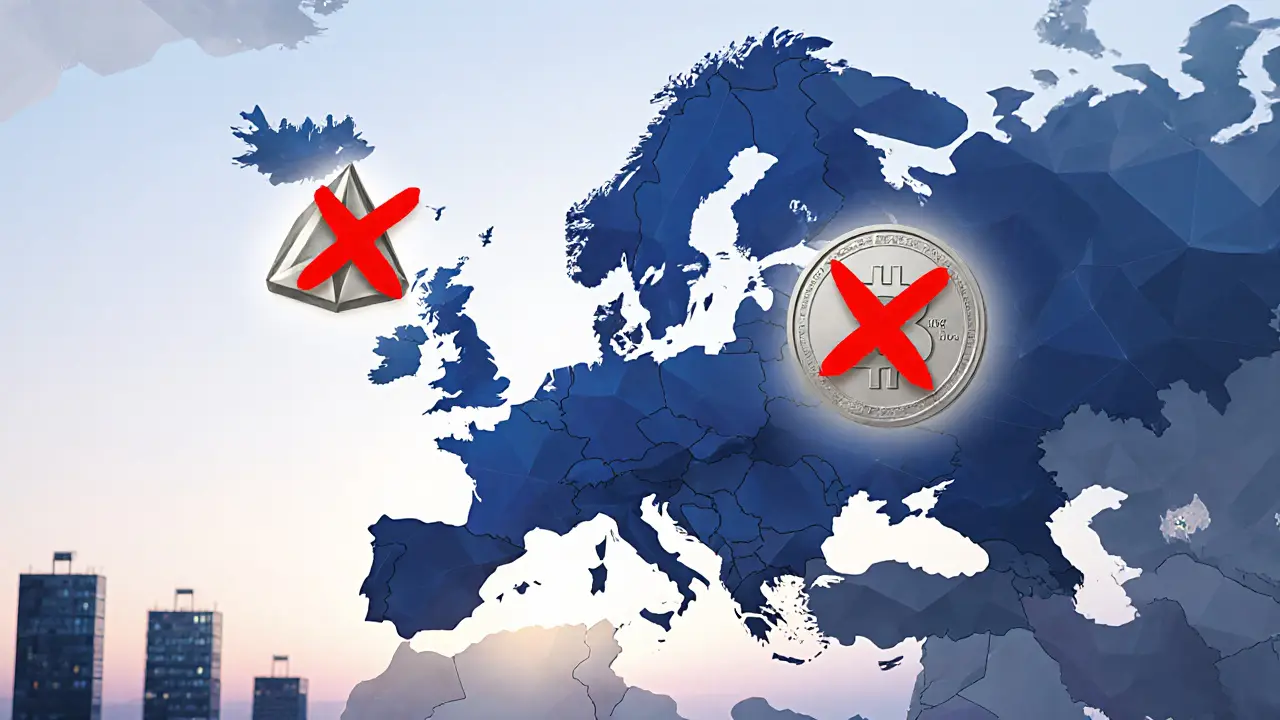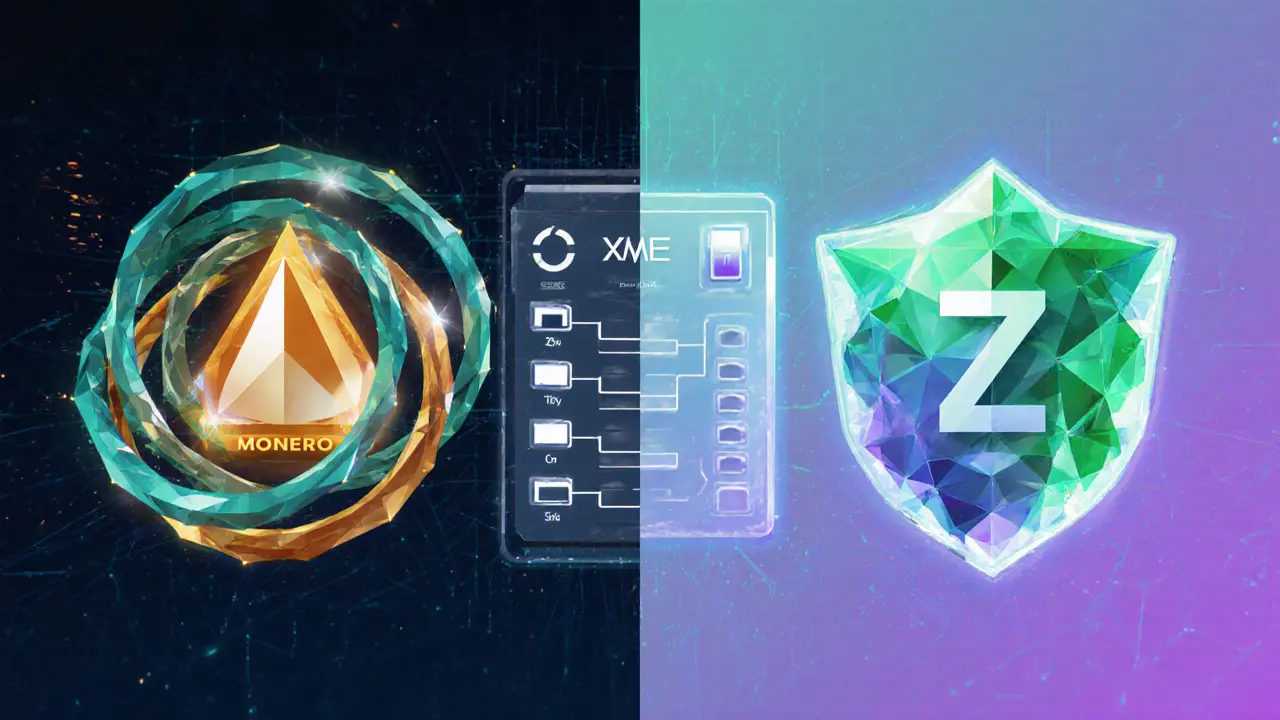EU to Ban Privacy Coins Monero & Zcash by 2027 - What It Means

EU Privacy Coin Compliance Checker
As per Regulation 2024/1624 and Article 79 of AMLR, all EU-regulated crypto-asset service providers must cease offering Monero (XMR) and Zcash (ZEC) after this date.
Monero (XMR)
- Ring Signatures
- Stealth Addresses
- RingCT
All transactions are fully private by default.
Zcash (ZEC)
- Zero-Knowledge Proofs
- Shielded Transactions
- Transparent Mode
Only shielded transactions are private; transparent mode is traceable.
EU privacy coin ban is a regulatory move introduced by the European Union that will prohibit privacy‑focused cryptocurrencies such as Monero (XMR) and Zcash (ZEC) from being offered by any EU‑regulated crypto‑asset service provider after 1July2027. The ban stems from Regulation2024/1624 and is enforced through Article79 of the new Anti‑Money Laundering Regulation (AMLR). It targets anonymous crypto accounts, demanding full identity verification for transactions over €1,000 and effectively removes the anonymity layer that privacy coins provide.
TL;DR
- EU will ban the handling of Monero and Zcash on all regulated platforms from July12027.
- The ban is part of Regulation2024/1624 and enforced via Article79 of AMLR.
- Crypto‑asset service providers (CASPs) must drop privacy‑coin services or relocate outside the EU.
- Individual ownership is not criminalised; users can still hold coins via DEXs or non‑EU wallets.
- Expect market shift toward non‑EU jurisdictions and increased regulatory scrutiny worldwide.
What triggers the ban?
The EU’s anti‑money‑laundering drive aims to bring crypto under the same transparency rules as traditional finance. Regulators identified three technical features that clash with AML standards:
- Ring signatures (Monero) - blend a transaction with many others, making it impossible to trace the sender.
- Stealth addresses (Monero) - generate a one‑time destination for each payment, hiding the receiver.
- Zero‑knowledge proofs (Zcash) - allow shielded transactions where sender, receiver, and amount are hidden.
Because these mechanisms erase the audit trail that AML checks require, the European Crypto Initiative (EUCI) concluded they pose “unacceptable risks” for money‑laundering and terrorist financing.
Key regulatory pieces
Four main documents shape the ban:
- Regulation2024/1624 - the overarching AML law that introduced the ban.
- Article79 of the Anti‑Money Laundering Regulation (AMLR) - explicitly forbids CASPs from offering “anonymity‑enhancing coins”.
- The Markets in Crypto‑Assets (MiCA) framework - provides the licensing regime for crypto service providers, now amended to align with AMLR.
- The upcoming supervisory guidelines from the Anti‑Money Laundering Authority (AMLA) - will detail enforcement tactics and penalties.
How the ban works in practice
From the implementation date, any EU‑registered exchange, wallet provider, or custodial service must:
- Remove all Monero and Zcash listings from their platforms.
- Disable deposits, withdrawals, and trading of these coins.
- Notify existing users and provide a two‑year window to withdraw or convert holdings.
- Report any attempts to circumvent the rule to AMLA, which will monitor roughly 40 major firms initially.
The ban does not criminalise private possession. Users can still hold XMR or ZEC in non‑EU wallets, on decentralized exchanges (DEXs), or through overseas custodians. However, moving funds into the EU financial system will require conversion to a “transparent” crypto such as Bitcoin or Ethereum, which are traceable under the new AML standards.

Impact on Monero and Zcash markets
Europe represents one of the largest crypto markets, accounting for billions in daily trading volume. The ban will therefore shrink the liquidity pool for privacy coins, likely causing short‑term price volatility. Historical data shows a 12‑15% dip in XMR price after the May2025 bitcoinblog.de analysis flagged the impending restriction.
Long‑term effects may include:
- Increased trading on DEXs that operate outside EU jurisdiction.
- Migration of CASP operations to crypto‑friendly jurisdictions such as Switzerland or Singapore.
- Potential development of “privacy layers” on top of compliant assets to sidestep the ban.
Comparison: Monero vs Zcash under the EU ban
| Feature | Monero (XMR) | Zcash (ZEC) |
|---|---|---|
| Core privacy tech | Ring signatures, stealth addresses, RingCT | Zero‑knowledge proofs (zk‑SNARKs) for shielded transactions |
| Default transaction type | Fully private (no optional mode) | Optional - transparent and shielded modes |
| Traceability under AMLR | Untraceable - fails AML verification | Shielded transactions untraceable; transparent mode traceable |
| EU regulatory status (2025‑2027) | Prohibited on all EU‑regulated platforms | Prohibited on all EU‑regulated platforms (shielded mode) |
| Potential work‑around | Use non‑EU custodians or DEXs | Trade via transparent mode or non‑EU services |
What crypto service providers can do now
Providers have two years to align with the new rules. Practical steps include:
- Audit all listed assets for privacy‑enhancing features.
- Communicate a clear withdrawal timeline to users holding XMR or ZEC.
- Develop conversion pipelines to move assets into compliant cryptocurrencies.
- Update KYC/AML policies to flag any attempts to deposit privacy coins.
- Prepare for AMLA supervision by documenting compliance processes.
Those that ignore the deadline risk hefty fines - early estimates from the European Banking Authority suggest penalties up to €5million per breach or 5% of annual turnover, whichever is higher.
Global ripple effects
The EU’s stance is already influencing other jurisdictions. Analysts note that the UK’s Financial Conduct Authority is reviewing similar language for its upcoming crypto‑AML framework. In Asia, Singapore’s MAS has hinted at stricter reporting for privacy‑coin transactions that cross its borders.
Because the EU sets a high regulatory bar, future international standards may echo its approach, making privacy‑coin compliance a global challenge rather than a regional quirk.
Frequently Asked Questions
Will owning Monero or Zcash be illegal in the EU?
No. The ban targets only the offering of privacy coins by regulated services. Individuals can still hold XMR or ZEC in personal wallets or on non‑EU platforms.
What happens to my existing holdings on an EU exchange?
Exchanges must give users at least a two‑year window to withdraw or convert their privacy‑coin balances. After the July2027 deadline, the assets will be delisted and inaccessible through that platform.
Can I trade Monero on a decentralized exchange?
Yes, as long as the DEX is not based in an EU‑regulated jurisdiction. However, using a DEX may still expose you to other risks, such as smart‑contract vulnerabilities.
Why does the EU treat privacy coins differently from Bitcoin?
Bitcoin’s transaction data is fully transparent and can be linked to addresses, making AML monitoring feasible. Privacy coins deliberately hide sender, receiver, and amount, which regulators deem incompatible with AML requirements.
What are the penalties for non‑compliance?
The European Banking Authority can levy fines up to €5million per violation or 5% of a firm’s yearly turnover, whichever is greater. Repeated breaches could lead to license revocation.

Next steps for users and businesses
If you hold Monero or Zcash on an EU‑based platform, start planning a migration now. Export your private keys, move the funds to a non‑EU wallet, or convert to a compliant asset before the deadline.
Crypto businesses should begin a compliance audit immediately, document every privacy‑coin touchpoint, and engage legal counsel to avoid costly penalties. Watching the AMLA consultation updates will be crucial, as final technical standards may introduce additional reporting obligations.
Overall, the EU privacy coin ban reshapes the European crypto landscape, pushing privacy‑focused activity offshore while strengthening AML oversight across the bloc. Staying ahead of the July2027 cutoff will protect both users and service providers from regulatory fallout.

Marie-Pier Horth
October 3, 2025 AT 18:13Ah, the grand EU theatre rolls out yet another act, this time casting privacy coins as the villains. They claim it’s all about stopping money‑laundering, but the narrative feels more like an artistic protest against anonymity. By 2027 we’ll see Monero and Zcash vanish from regulated exchanges, leaving a silent void for the daring few. The ripple will push the truly private to the shadows, where myths become legends. In the end, liberty fights bureaucracy with the same stubborn resolve.
Gregg Woodhouse
October 4, 2025 AT 17:50This is just more bureaucratic nonsense.
F Yong
October 5, 2025 AT 17:26So the EU decides to outlaw XMR and ZEC – because apparently hiding your money is a crime now. It’s amusing how regulators love to tout transparency while ignoring the fact that cash is already anonymous. If you think a table of regulations will magically erase illicit flows, you’re living in a fantasy. The true innovators will simply shift to offshore platforms, rendering this ban a symbolic gesture at best. Meanwhile, everyday users are left scrambling for an exit strategy.
Sara Jane Breault
October 6, 2025 AT 17:03Hey, don’t panic! Move your XMR or ZEC to a non‑EU wallet or a trusted DEX. Two years is plenty of time to set up a secure backup. Keep your private keys safe and write down the seed phrase. If you need help, just hit me up – I’ve done this a few times. Stay chill and stay in control.
Janelle Hansford
October 7, 2025 AT 16:40What a huge shift for the crypto community! It’s actually a great chance to explore more open‑source solutions outside the EU. I love how this pushes us to think globally and diversify our holdings. Keep an eye on new compliance tools that can make the transition smooth. Let’s turn this challenge into an opportunity for growth.
Marie Salcedo
October 8, 2025 AT 16:16Super exciting to see clarity coming from regulation. It helps newcomers understand the rules without getting lost. If you’re still holding privacy coins on an EU exchange, start planning your move now. Converting to Bitcoin or Ethereum can be simple with the right platform. The future looks bright once we all adapt together.
Mangal Chauhan
October 9, 2025 AT 15:53Indeed, the regulatory landscape demands a proactive stance 🌐. While the EU’s measures may appear restrictive, they also underscore the necessity for robust compliance frameworks. Users should consider diversifying into assets with transparent transaction histories to streamline cross‑border operations. Additionally, leveraging reputable custodial services outside the EU can ensure continued access to privacy‑centric holdings without legal friction. This approach not only mitigates risk but also aligns with best practices endorsed by international financial authorities. 😊
Iva Djukić
October 10, 2025 AT 15:30When legislatures attempt to legislate the very notion of secrecy, they enter a paradox that has echoed through centuries of philosophical inquiry. The desire for privacy, rooted in the human yearning for autonomy, clashes with the state’s mandate for surveillance in the name of security. By targeting Monero and Zcash, the European Union is not merely regulating financial instruments but is also shaping the ontology of trust in the digital age. One could argue that this move reflects a Hobbesian view where order necessitates surrendering certain freedoms, yet it also betrays the Kantian principle that individuals possess an inherent right to self‑determination. The technical architecture of these coins-ring signatures, stealth addresses, zk‑SNARKs-embodies a cryptographic manifestation of that autonomy, rendering transactions opaque to any external observer. As regulators draw a line at opacity, they inadvertently highlight the value of the very privacy they seek to curtail. History teaches us that attempts to suppress cryptographic privacy often catalyze innovation, as seen with the emergence of new privacy layers built atop compliant assets. Moreover, the ban may accelerate the migration of capital toward jurisdictions with more favorable legal environments, thereby reshaping global liquidity flows. This redistribution could destabilize Euro‑centric markets while empowering alternative hubs, a phenomenon reminiscent of the Silk Road’s unintended economic consequences. From a utilitarian perspective, the collective benefit of reducing illicit financing must be weighed against the individual cost of eroding financial sovereignty. The balance is delicate: too much restriction stifles legitimate usage, too little invites abuse. In practice, the two‑year grace period offers a pragmatic compromise, granting users a runway to adjust their holdings without immediate disruption. Yet the psychological impact of such a regulatory announcement echoes beyond its temporal scope, sowing uncertainty that may dampen investment enthusiasm across the broader crypto ecosystem. Ultimately, the EU’s policy decision serves as a living case study in the ongoing dialectic between privacy and transparency, a debate that will define the contours of digital liberty for generations to come. As stakeholders navigate this terrain, a nuanced approach that respects both security imperatives and personal freedoms will be essential for sustainable progress.
Darius Needham
October 11, 2025 AT 15:06Your analysis is impressively thorough, but let’s cut to the chase: the market will adapt, and the coins will survive by moving offshore. Regulators can’t stop determined users, so the real battle is about where the liquidity ends up. Keep an eye on Swiss and Singapore exchanges – they’ll be the new bastions of privacy.
carol williams
October 12, 2025 AT 14:43The EU’s ban is nothing short of a legislative overreach that betrays the very principles of economic freedom. By dictating which cryptographic technologies may exist, Brussels is effectively playing god with innovation. Every seasoned crypto analyst knows that such heavy‑handed policies only serve to push activity into the shadows, where it becomes even harder to monitor. It’s a classic case of the cure being worse than the disease, and history is littered with similar missteps. The only logical conclusion is that this move will accelerate the fragmentation of the market, benefiting only those who can navigate jurisdictional loopholes.
Ally Woods
October 13, 2025 AT 14:20Yeah, sounds dramatic but it’s probably just another headline.
Anurag Sinha
October 14, 2025 AT 13:56Wake up! This “privacy coin ban” is a smokescreen, a covert operation to funnel crypto assets straight into the hands of the global elite. They want us to think it’s about AML, but the real agenda is total financial control. Keep your keys, trust no exchange, and question every press release – they’re all part of the same grand design.
Raj Dixit
October 15, 2025 AT 13:33Such policies are necessary to protect our nation’s financial integrity and prevent foreign influence.